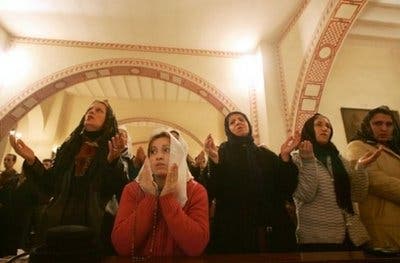Arabs reject foreign "interference" on Christians
Leaders oppose “foreign attempt to interfere in Arab affairs
Arab leaders on Wednesday voiced their "total rejection" of foreign interference in Arab affairs, especially over the region's Christian minorities.
"Arab kings and presidents ... express their total rejection of attempts by certain states and foreign parties to intervene in Arab affairs in the name of protecting the minorities of the East," they said in a final statement after a summit in Egypt's Red Sea resort of Sharm el-Sheikh.
This "demonstrates a regrettable lack of understanding of the nature of the terrorist acts .... and a harmful ignorance of the history of the people of the region," it read.
The statement came in response to repeated Western calls for the protection of the Arab world's Christian communities after two deadly attacks on churches in Egypt and Iraq.
Arab leaders said they opposed "any foreign attempt to interfere in Arab affairs under any pretext, or using events to tarnish the image of Islam and Muslims, or to sow sectarianism between Muslims and Christians."
Washington has said it was "deeply concerned" about the rise in attacks against Christians in the Middle East after an attack on worshippers emerging from a New Year's mass in Alexandria, northern Egypt, killed 23 people.
Cairo recalled its envoy to the Vatican over remarks by Pope Benedict XVI on Coptic Christians in Egypt.
The pope said the Alexandria attack was "yet another sign of the urgent need for the governments of the region to adopt ... effective measures for the protection of religious minorities".
In October, 46 Christians were killed in an attack on a church in the Iraqi capital that was claimed by an al-Qaeda affiliate, which also threatened the Coptic church.
A statement posted on an Islamist website called on Muslims to "bomb churches during the Christmas holiday when churches are crowded".
On Tuesday the head of Egypt's Coptic Orthodox Church cancelled celebrations for the Feast of Epiphany over concerns for the safety of the country's Christians after the New Year's Day bombing.
Officials suspect an al-Qaeda-inspired bomber was behind the New Year's blast outside a church in the port city of Alexandria. Islamist websites had carried repeated threats to attack churches and have since carried threats to strike again.
Alexandria's attack was on a much bigger scale and appeared far more organized than the kind of violence that usually erupts when communal frustrations boil over, analysts say.
The cradle of Christianity, the Middle East is home to 20 million Christians out of a total population of more than 356 million people, according to the Vatican. Attacks on churches have stepped up an exodus of Christians.
Arab kings and presidents ... express their total rejection of attempts by certain states and foreign parties to intervene in Arab affairs in the name of protecting the minorities of the EastStatement by Arab leaders
